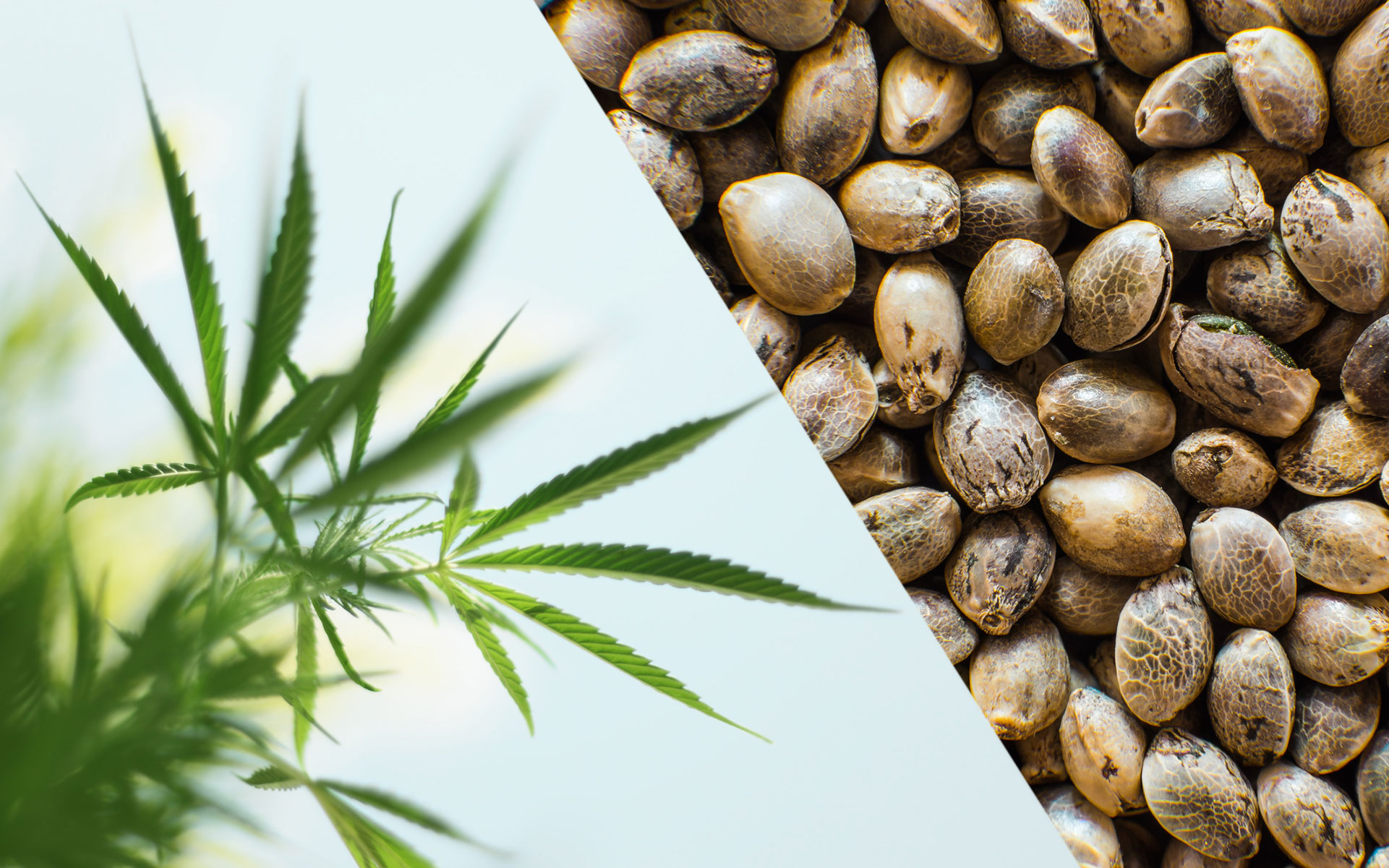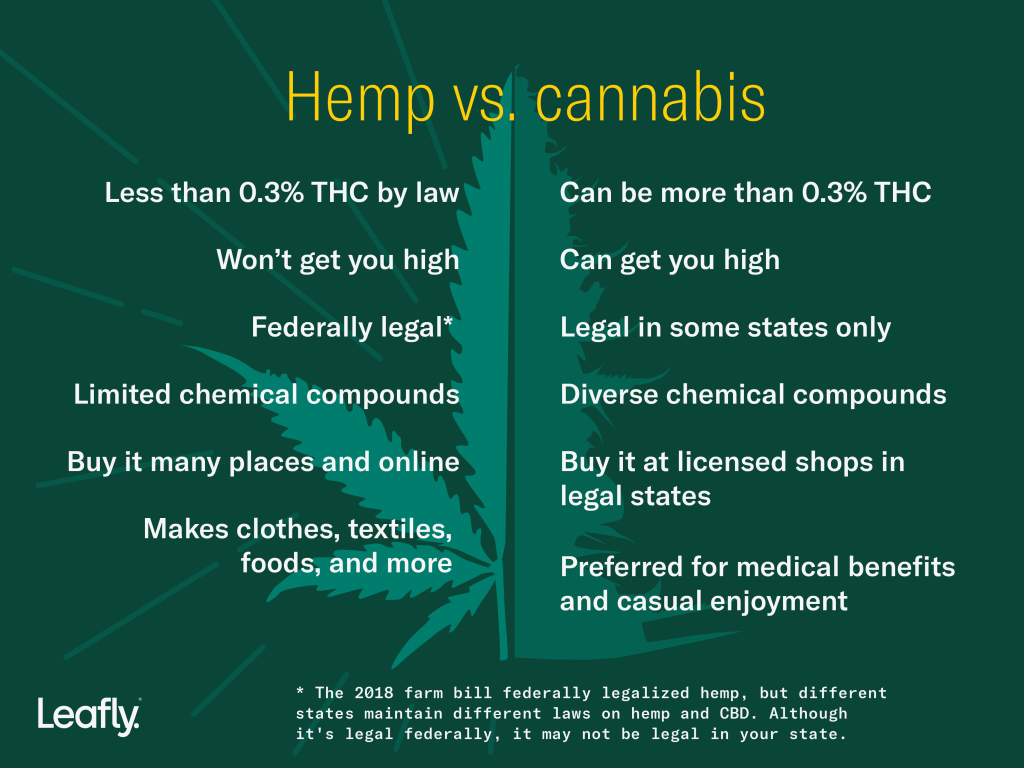SPONSOR: PRIMO NUTRACEUTICALS INC. (CSE: PRMO) (OTC: BUGVF) (FSE: 8BV) (DEU: 8BV) (MUN: 8BV) (STU: 8BV) provides strategic capital to the thriving cannabis cultivation sector through ownership and development of commercial real estate properties. The company also offers fully built out turnkey facilities equipped with state-of-the-art growing infrastructure to cannabis growers and processors. Click here for more info.

What’s the difference between CBD derived from hemp and cannabis?
By: Emma Ston

- What’s in a name? When it comes to CBD products derived from hemp, CBD products derived from cannabis, and what’s considered legal, a lot.
- Understanding cannabis nomenclature and the chemical difference between the two plants is essential to making informed choices about CBD.
Cannabis refers to a genus of plants which has three species: indica, sativa, and ruderalis. Hemp is not a different species of the cannabis plant. The above classifications have been devised to differentiate intoxicating cannabis from non-intoxicating cannabis. Hemp is a sativa species, while cannabis can be sativa, indica, or ruderalis.
Although hemp and cannabis look (sort of) similar, from a functional and chemical perspective, they are distinctive. Here’s how you can distinguish the two.

(Leafly)
Hemp:
- In order to be federally legal, it must contain 0.3% THC or less. For the uninitiated, THC is the cannabinoid that causes a high. With so little THC, hemp doesn’t have intoxicating effects.
- Can be used to create products such as textiles, building materials, industrial products, paper, foods, and body care.
- Is typically grown outdoors to maximize the size and yield of the plant. Hemp doesn’t require the same rigorous attention to lighting, humidity, and temperature that cannabis requires, and it can be grown in a range of different climates.
- Tends to be tall and skinny with skimpy foliage, having an appearance similar to bamboo.
Cannabis:
- Can contain 0.3% THC or more. Some high-THC strains can have 30% THC or more.
- Is used for recreational or medicinal purposes. You won’t find cannabis plants being used to create hempcrete or denim.
- Is generally grown in carefully managed and controlled conditions. Photoperiodic cannabis requires precise exposure to light in order to flower—its buds contain the valuable, potent compounds cannabis is famed for.
- Tends to appear bushy, with large, full foliage.
Here’s the tricky thing: Both cannabis and hemp produce CBD. The CBD molecule is identical regardless of its cannabis source. However, from a legal perspective, CBD products derived from hemp and CBD products derived from cannabis are entirely different.
Hemp-derived CBD and cannabis-derived CBD: A legal perspective
According to federal law, cannabis—with 0.3% THC content or higher—is classified by the DEA as a Schedule I drug with no accepted medical use. CBD products sourced from cannabis, even those with 0% THC, are illegal at a federal level by virtue of their plant origin. Here’s the tricky thing: Both cannabis and hemp produce CBD. The CBD molecule is identical regardless of its cannabis source.
However, at a state level, the law changes. There are 33 US states which have medical cannabis programs, and CBD derived from cannabis is available from a licensed dispensary to eligible patients. The recreational use of cannabis is also legal in 11 states. In these states, cannabis-derived CBD products are available to those of age.
Industrial hemp, on the other hand, is no longer considered a Schedule I controlled drug. Following the 2018 farm bill, hemp was reclassified as an agricultural commodity. Since then, there has been an explosion of CBD products onto the market, prompting the U.S. Food and Drug Administration (FDA) to issue a statement that a regulatory framework for CBD products is still in the pipeline, and foods containing CBD, dietary supplements, and products making health claims are considered illegal.
CBD products sourced from hemp, such as oils and tinctures, are legal at a federal level, so long as they conform with other applicable laws. That said, certain states have their own legislation and regulations regarding CBD oil.
If you want to purchase CBD and err on the right side of the law, verify the legal status of hemp-derived CBD and cannabis-derived CBD in your state, so you know what you can or can’t purchase. Generally, hemp-derived CBD represents the more legal option.
Other differences between hemp-derived CBD and cannabis-derived CBD
CBD concentration
Cannabis represents a richer source of cannabinoids and terpenes than industrial hemp because it contains significantly more resin. Resin is the sticky, gooey substance found on female cannabis flowers, and to a lesser extent, on its leaves. Hemp contains resin on the flowers and leaves too, but much less. Most industrial hemp cultivators need to grow large quantities of hemp to produce CBD oil, although there are now more CBD-rich hemp strains being cultivated.
Safety
Hemp is a bioaccumulator, so it can absorb toxins such as residual pesticides and heavy metals from soil. When CBD is extracted from large quantities of industrial hemp cultivated in non-organic conditions, there is a possibility that contaminant residue will be passed into the final product. CBD products sourced from tainted hemp can compromise safety and efficacy.
Regulation
The hemp-derived CBD market is not yet subject to a widely enforced regulatory framework. For this reason, it’s essential to do your homework when buying hemp-derived CBD.
Look out for hemp-derived CBD that has been third-party tested. Products that have undergone this have been checked by an independent group outside of the producer using industry-approved techniques. The tester verifies the cannabinoid content of the product, along with heavy metals, pesticides, or microbes. Related
How to read a CBD label
A hemp-derived CBD product that has been third-party tested also guarantees you are getting what you paid for. Leafly’s investigation on CBD tested 47 products and found that almost half of them didn’t come within 20% of the labeled dosage. Third party testing confirms that the promised CBD content is present.
You can also look for hemp-derived CBD products with a USDA organic certification. This affirms that the growing conditions meet official USDA organic standards, and also provides assurance that the hemp extraction process was free of synthetic chemical additives.
In states where cannabis-derived CBD products are available from licensed dispensaries, there is greater regulation of these products. All are subjected to stringent testing from licensed facilities.
Effectiveness
Cannabis tends to have a wider terpene and cannabinoid profile than hemp. Cannabis-derived CBD from whole plant extract contains a range of beneficial terpenes and cannabinoids, including THC. These compounds work in concert with each other to provide additional benefits. This phenomenon is known as the entourage effect, and many cannabis experts assert that whole plant extracts offer greater therapeutic potential.
Hemp also contains some cannabinoids and terpenes, but not the range nor concentration of compounds present in cannabis. Hemp-derived CBD can be made into an full-spectrum extract that offers natural terpenes alongside minor cannabinoids. Broad-spectrum CBD is also available and contains minor cannabinoids and terpenes, but without the THC content.
However, full-spectrum and broad-spectrum hemp-derived CBD products may not have the potency of CBD derived from cannabis because trace amounts of THC appear to be less effective in treating certain symptoms.
CBD isolate
CBD can also be extracted from both hemp and cannabis to become an isolate. Isolates are identical whether derived from hemp or cannabis because they only contain CBD molecules. As there is more CBD in cannabis than hemp, it requires more hemp by dry weight to produce the same amount of CBD isolate.
CBD isolate is most commonly used in clinical trials to prove that results are linked to CBD rather than other compounds from either plant that may be present. Isolates may also be favored by those who wish to avoid THC entirely.
Source: https://www.leafly.com/news/cbd/hemp-vs-cannabis-derived-cbd-whats-the-difference






